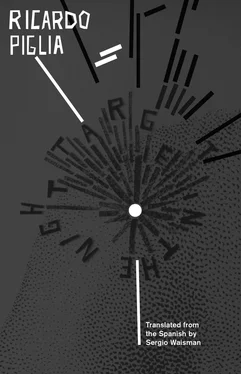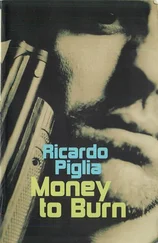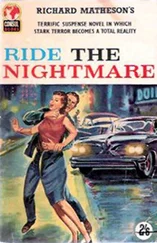Ricardo Piglia - Target in the Night
Здесь есть возможность читать онлайн «Ricardo Piglia - Target in the Night» весь текст электронной книги совершенно бесплатно (целиком полную версию без сокращений). В некоторых случаях можно слушать аудио, скачать через торрент в формате fb2 и присутствует краткое содержание. Год выпуска: 2015, Издательство: Deep Vellum, Жанр: Современная проза, на английском языке. Описание произведения, (предисловие) а так же отзывы посетителей доступны на портале библиотеки ЛибКат.
- Название:Target in the Night
- Автор:
- Издательство:Deep Vellum
- Жанр:
- Год:2015
- ISBN:нет данных
- Рейтинг книги:3 / 5. Голосов: 1
-
Избранное:Добавить в избранное
- Отзывы:
-
Ваша оценка:
- 60
- 1
- 2
- 3
- 4
- 5
Target in the Night: краткое содержание, описание и аннотация
Предлагаем к чтению аннотацию, описание, краткое содержание или предисловие (зависит от того, что написал сам автор книги «Target in the Night»). Если вы не нашли необходимую информацию о книге — напишите в комментариях, мы постараемся отыскать её.
is an intense and tragic family history reminiscent of
, in which the madness of the detective is integral to solving crimes.
, a masterpiece, won every major literary prize in the Spanish language in 2011.
Ricardo Piglia
Target in the Night — читать онлайн бесплатно полную книгу (весь текст) целиком
Ниже представлен текст книги, разбитый по страницам. Система сохранения места последней прочитанной страницы, позволяет с удобством читать онлайн бесплатно книгу «Target in the Night», без необходимости каждый раз заново искать на чём Вы остановились. Поставьте закладку, и сможете в любой момент перейти на страницу, на которой закончили чтение.
Интервал:
Закладка:
“How do you do, Don Croce?”
“Cheers, Hilario,” Croce said. “So, what happened here?”
“A misfortune,” he spoke, and smoked. “He asked me to come,” he said. “When I got here he had already done it.” He kept smoking. “Yeah,” he said, pensively. “In his religion it’s allowed.”
“No, you’re not allowed to kill,” Croce said.
“Have respect for him, Inspector. He was a good person. He had the one misfortune. No one feels pity for the guilty,” he stated after a while.
Croce paced back and forth. Like always, he was postponing the moment when he would have to go in and see a dead body. He peeked in and came back out.
“He said something to you about the American,” Croce said.
“He left a letter, I haven’t opened it. It’s where he put it, by the window.”
The house had a packed, dirt floor and was lit by a dim lamp, fading with the light of dawn. There was a stove to one side, unlit. On the other side, lying on a foldout bed under a woven blanket, was el Chino Arce. On a mat next to the deceased, Hilario had put a few weeds in a pitcher. A country wake, Renzi thought. A locust jumped out of the pitcher, rubbed its eyes with its antennas, and jumped on el Chino’s yellowish face. Renzi shooed it away with his handkerchief, and the insect hopped off toward the stove. In the dead man’s hands, as if it were a holy card, Hilario had placed a photograph of the jockey sitting on his horse on the runway before a race at the track in La Plata.
“He used a shotgun. He was so short he was able to lean the barrel against his mouth and shoot standing up,” Hilario said, with a strong country accent. The shotgun was off to one side, resting carefully against the leather seat of a small stool.
They uncovered the dead man and saw that he was wearing country trousers, a flowered shirt, and a scarf around his neck. He was a yellow gaucho, all dressed up, his right foot bare with a gunpowder burn on its big toe. They could have killed him and made it look like a suicide, with the shotgun and all, Croce thought. Maybe he was choked, he added in his thoughts, but when he removed the scarf from the dead man’s neck, Croce saw that there were no marks there, except for the shot on the roof of his mouth where his brains had been blown out. That was probably why Hilario had put a scarf there, to cover the site of the wound.
“He killed himself there,” Hilario said, “standing next to his little foldout bed, and I fixed him up. He wasn’t a Christian, you know, that’s why I covered the Virgin.”
In the letter el Chino left the horse to Hilario, asking him to take care of it, and feed it fresh alfalfa and run it every day. He reminded Hilario to tend to the horse’s recovering broken leg, the horse wasn’t supposed to walk on rocks or wet ground. There was no mention of who had hired him to kill Durán. The letter implied that he had done it to buy the animal, but it didn’t say who had told him what he was supposed to do, or why he had killed himself.
“He was very bitter,” Hilario said. “Neurasthenic.”
The word, spoken by this man, sounded like a definitive diagnosis.
The jockey, then, had been paid to kill Durán, but he had only taken as much money as he needed to buy the horse. He was scared, when he saw his photograph in the newspaper he thought he would be found out. He had been on the run, but in the end he had holed himself up in that partially abandoned country house and ended it all.
“He was a good person, rough but straight. He had the one misfortune. I’ll tell you what happened.”
The three men sat down as if they were keeping vigil, Hilario prepared a few mates , and they drank in a circle. So hot and bitter that Renzi burned his tongue and barely said anything the whole night.
“I was a broncobuster, first in La Blanqueda, then here in Tapalqué, until one afternoon they came with a station wagon to pick me up because word had gotten around that I was good at taming colts, I get along with horses, so they came and hired me for the Manditeguy stud farm. Race horses, or for polo. Delicate horses, very sensitive. If a horse isn’t tamed right,” he said, “it develops bad habits, and later when it runs it’ll do all sorts of crazy things.”
“Yes, you’re right about that,” Croce said.
“Aha,” Hilario said. “Yes, that’s right, but it’s hard to do. That’s what I was born for,” he went on. “You have to get along with the animal. There’s no one left who really knows how to tame a horse, Don Croce. Beating and whipping them, that won’t get you anywhere. El Chino was very admired. The Menditeguy had brought him in because they’d seen him racing when he trained in Maroñas, in the Oriental Republic, he was the best. He didn’t say much, but he knew how to sit on a horse, very light, very proud. Horses pick up on things like that, animals can tell right away what the rider is like. He and Tácito understood each other as if they’d been born together, one on top of the other, but then the misfortune happened and I was the only one who could step in. It took me six months to get the horse so el Chino could ride him again, even though he was light as a feather and gentle as a girl.”
This is going to take all night, Renzi thought, already half asleep. At one point he had the feeling that he had dreamt that he was in bed with a woman, someone like the Belladona sister he’d seen at the Club. A redhead. He had always liked redheads, so it could have been another woman, Julia even, whose hair was also red. He didn’t see her face, only her hair. She was naked, he was looking at her from behind, she was leaning over to tie a black shoelace at the ankle. I’ll put on my high heels so you can check out my ass , the girl said in the dream, turning toward him. I must have asked her to walk around the room, he thought all of a sudden, waking up.
“He killed him for the horse. That’s why he did it, to save the horse. The rancher from Luján, the Englishman, he was going to sell him off, to breed him, he was going to send him out to pasture, el Chino wouldn’t have been able to ride him anymore. Where could he get so much money from? He thought he was lost, he was going crazy. It’s all business now, they don’t use horses anymore, except to race or play polo, or for the girls in the estancias to go out for a ride. A handler, just imagine, a man who knows how to lasso, halter horses, bullocks like Blind-Man Míguez, just to name one, there’s none left, no one needs them anymore.”
“Who came to see him?”
“I don’t know, he went to town and met a man who’s not from around here, I wasn’t there when he set it up. One day he just showed up with the money. I didn’t find out how. He’d come, he’d go, drink a few quick mates , have a smoke, he was all worked up, he wanted to lose weight so he could ride the horse without the horse realizing that anyone was even on him. He started taking pills around then, Actemin, the kind of garbage that jockeys take to keep from eating, because they always have problems with the scales. El Chino wasn’t usually like that, he was always light as a frog, but now he didn’t want to weigh anything at all, he didn’t want to put any extra pressure on the sorrel because of its broken leg.” He tells it all tangled up, Renzi thought, as if we already knew what he was talking about, or as if we had been there. There was a moment of silence. Hilario, like any good storyteller, left blanks and didn’t spell out the connections. “He was such a high-quality three-year-old racehorse,” he went on, “that even the price that el Chino paid for him was fair, high as it was. Very unusual too, because of the bad leg.” Renzi realized that he’d fallen asleep again and had missed part of the story. It was strange being there, sitting in that room with the dead man, the dim lamp lit even though it was already daylight, the burnt smell from the small stove to heat water, it all kept making him sleepy. Anyway, everything the man was saying was about the horse, up one side and down the other, as if he were putting together a puzzle, Hilario the gaucho. “ Tácito , whose father’s father was Congreve , fast as a light. In his debut at Palermo he got the fastest time any horse has ever gotten in a thousand-meter debut. Better than Penny Post , better than Embrujo , better than all of them. To el Chino’s merit, I would add, because a horse runs with the courage and the brains of its jockey, especially when it first debuts and doesn’t have any experience yet. He had a unique style, el Chino did,” he said. “He’d lean forward from the very beginning of the race, as if he was already at full speed from the start. Well, you know,” he added, as if they knew, “he won his first five races, then the misfortune. We had the accident at the San Isidro Stakes, with the colts.”
Читать дальшеИнтервал:
Закладка:
Похожие книги на «Target in the Night»
Представляем Вашему вниманию похожие книги на «Target in the Night» списком для выбора. Мы отобрали схожую по названию и смыслу литературу в надежде предоставить читателям больше вариантов отыскать новые, интересные, ещё непрочитанные произведения.
Обсуждение, отзывы о книге «Target in the Night» и просто собственные мнения читателей. Оставьте ваши комментарии, напишите, что Вы думаете о произведении, его смысле или главных героях. Укажите что конкретно понравилось, а что нет, и почему Вы так считаете.












